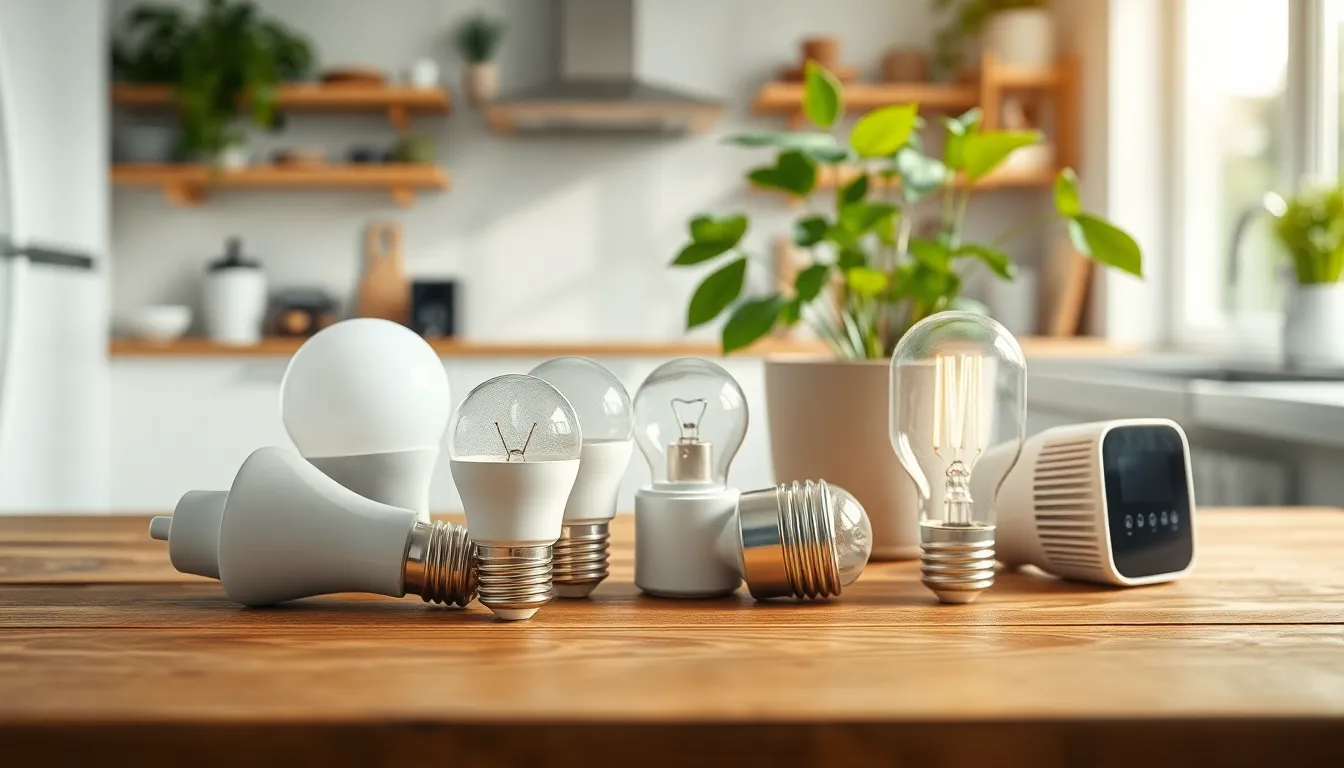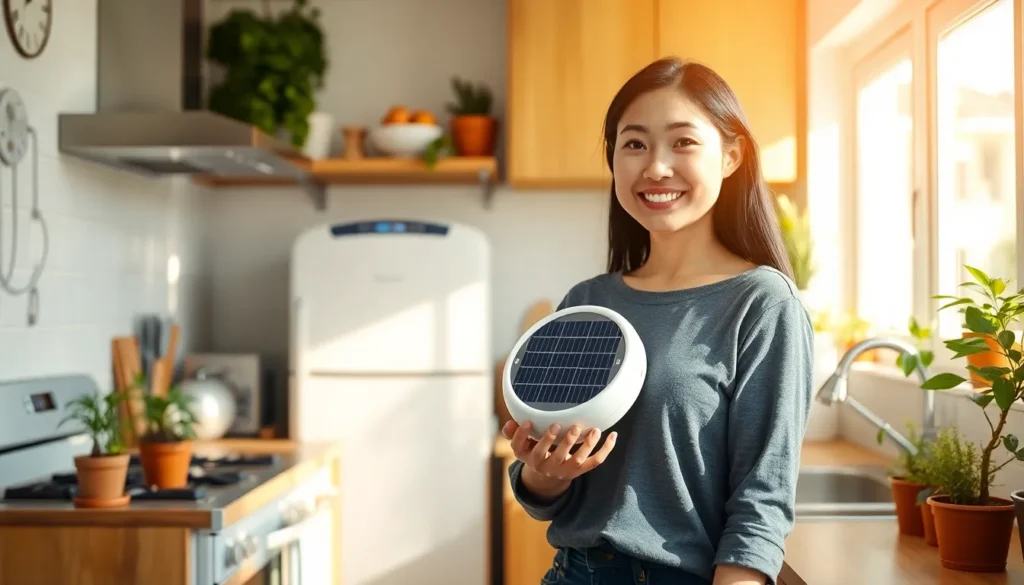Table of Contents
ToggleIn a world increasingly aware of environmental issues, eco-conscious devices are gaining traction as essential tools for sustainable living. These innovative technologies not only reduce ecological footprints but also enhance everyday convenience. From energy-efficient appliances to biodegradable gadgets, eco-conscious devices are designed with both the planet and users in mind.
As consumers seek to make greener choices, the market is flooded with options that prioritize sustainability without sacrificing performance. These devices often utilize renewable materials and energy sources, making them a smart choice for those looking to contribute to a healthier planet. Embracing eco-conscious technology isn’t just a trend; it’s a vital step toward a more sustainable future.
Overview of Eco-Conscious Devices
Eco-conscious devices represent a significant shift toward sustainable living. These products leverage innovative technologies to minimize environmental impact while providing efficient performance.
Definition and Importance
Eco-conscious devices refer to products designed with sustainability in mind. They prioritize energy efficiency, reduced waste, and biodegradable materials. Their importance lies in curbing climate change impacts and promoting responsible consumption, enabling users to contribute positively to the environment. As awareness of ecological challenges grows, the demand for these devices continues to increase, making them essential to modern lifestyles.
Types of Eco-Conscious Devices
- Energy-Efficient Appliances: Energy-efficient appliances, such as refrigerators and washing machines, significantly lower energy consumption.
- Solar-Powered Gadgets: Solar-powered gadgets, like chargers and lights, harness solar energy, reducing reliance on traditional power sources.
- Biodegradable Electronics: Biodegradable electronics, including phone cases and packaging, decompose naturally, minimizing landfill waste.
- Smart Home Technologies: Smart home technologies optimize energy use through automation, making homes more efficient while enhancing user convenience.
- Water-Saving Devices: Water-saving devices, such as low-flow showerheads and smart irrigation systems, significantly reduce water usage.
These types of eco-conscious devices illustrate the variety of options available for consumers looking to minimize their ecological footprints while maintaining functionality.
Benefits of Using Eco-Conscious Devices

Eco-conscious devices offer numerous advantages, not only for individuals but also for the environment. These benefits include reduced ecological footprints and improved energy management.
Environmental Impact
Eco-conscious devices significantly reduce the environmental impact of daily activities. They minimize waste production through sustainable materials and promote responsible disposal methods. For example, biodegradable gadgets break down naturally, limiting landfill contributions. Energy-efficient appliances decrease greenhouse gas emissions by using less electricity, thus contributing to climate change mitigation. Adopting such devices fosters a culture of sustainability and encourages responsible consumption.
Energy Efficiency
Energy efficiency stands as a primary benefit of eco-conscious devices. Devices like LED bulbs, energy-efficient refrigerators, and smart thermostats utilize advanced technologies to lower energy use while maintaining performance. According to the U.S. Department of Energy, energy-efficient appliances can reduce energy usage by 10-50%. This reduction not only lowers utility bills but also decreases the demand for fossil fuels. The transition to energy-efficient products aids in conserving natural resources, ensuring a lasting positive impact on the planet’s energy resources.
Popular Eco-Conscious Devices on the Market
Eco-conscious devices offer sustainable solutions while ensuring functionality and convenience. The market features a wide array of these innovative products, designed to minimize environmental impact.
Solar-Powered Gadgets
Solar-powered gadgets harness renewable solar energy, significantly reducing reliance on traditional electricity sources. Products like solar chargers and solar-powered lights utilize built-in solar panels to convert sunlight into energy. These devices contribute to energy independence and lower electricity costs. For instance, a solar-powered outdoor light can save users up to 80% on lighting expenses compared to conventional electric lights. Furthermore, advancements in solar technology have led to compact, efficient designs, making these gadgets accessible for everyday use.
Energy-Efficient Appliances
Energy-efficient appliances consume less electricity while maintaining high performance levels, allowing users to save on utility bills. Appliances like Energy Star-rated refrigerators, washing machines, and dishwashers have been engineered to reduce energy consumption by 10-50% compared to standard models. For example, an Energy Star-certified washing machine can conserve up to 7,000 gallons of water annually. These appliances not only lower energy costs but also decrease greenhouse gas emissions, contributing to climate change mitigation. An investment in energy-efficient appliances results in long-term savings and promotes a more sustainable lifestyle.
How to Choose Eco-Conscious Devices
Selecting eco-conscious devices involves understanding their key features and verifying certifications. Making informed choices leads to sustainable consumption and reduced ecological footprints.
Key Features to Consider
- Energy Efficiency: Look for devices with high energy-efficiency ratings. Energy Star-certified products typically consume 10-50% less energy than standard options.
- Biodegradable Materials: Choose gadgets made from biodegradable materials. These products decompose more easily, reducing landfill waste.
- Durability: Prioritize products designed for longevity. Durable devices decrease the need for replacements, which lessens overall resource consumption.
- Smart Technology: Consider devices equipped with smart features. Smart home technologies optimize energy usage and enhance convenience by providing real-time data and automation.
- Water Conservation: Evaluate devices that promote water savings. Water-efficient fixtures and appliances minimize water waste, contributing to sustainable water management.
Certifications and Labels
Certifications and labels indicate a device’s environmental impact and sustainability credentials. Relevant certifications include:
- Energy Star: Denotes energy-efficient appliances meeting strict energy performance standards. Energy Star products often contribute to significant energy savings.
- UL EcoLogo: Represents products verified for reduced environmental impact, such as those using fewer harmful materials or recyclables.
- Forest Stewardship Council (FSC): Indicates products made from responsibly sourced wood and paper, promoting sustainable forestry practices.
- Cradle to Cradle Certified: Signifies that products meet rigorous criteria for material health, recyclability, and renewable energy usage.
- Green Seal: Identifies environmentally friendly products, focusing on safety, energy efficiency, and material sustainability.
Choosing eco-conscious devices with these key features and certifications supports sustainable living and encourages responsible consumption practices.
Embracing eco-conscious devices is a vital step toward sustainable living. As technology advances, consumers can access a wide range of products that not only perform well but also contribute positively to the environment. By prioritizing energy efficiency and responsible materials, these devices help reduce ecological footprints and encourage a healthier planet.
The shift toward greener options reflects a growing awareness of ecological challenges. As individuals make informed choices, they play an essential role in promoting sustainability. Adopting eco-conscious technology is more than a choice; it’s a commitment to a better future for generations to come.







